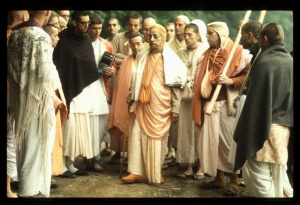SB 10.11.37

A.C. Bhaktivedanta Swami Prabhupada
TEXT 37
- evaṁ vrajaukasāṁ prītiṁ
- yacchantau bāla-ceṣṭitaiḥ
- kala-vākyaiḥ sva-kālena
- vatsa-pālau babhūvatuḥ
SYNONYMS
evam — in this way; vraja-okasām — to all the inhabitants of Vraja; prītim — pleasure; yacchantau — giving; bāla-ceṣṭitaiḥ — by the activities and pastimes of childhood; kala-vākyaiḥ — and by very sweet broken language; sva-kālena — in due course of time; vatsa-pālau — to take care of the calves; babhūvatuḥ — were grown up.
TRANSLATION
In this way, Kṛṣṇa and Balarāma, acting like small boys and talking in half-broken language, gave transcendental pleasure to all the inhabitants of Vraja. In due course of time, They became old enough to take care of the calves.
PURPORT
As soon as Kṛṣṇa and Balarāma were a little grown up, They were meant for taking care of the calves. Although born of a very well-to-do family, They still had to take care of the calves. This was the system of education. Those who were not born in brāhmaṇa families were not meant for academic education. The brāhmaṇas were trained in a literary, academic education, the kṣatriyas were trained to take care of the state, and the vaiśyas learned how to cultivate the land and take care of the cows and calves. There was no need to waste time going to school to be falsely educated and later increase the numbers of the unemployed. Kṛṣṇa and Balarāma taught us by Their personal behavior. Kṛṣṇa took care of the cows and played His flute, and Balarāma took care of agricultural activities with a plow in His hand.